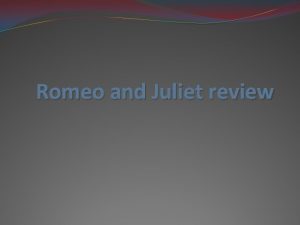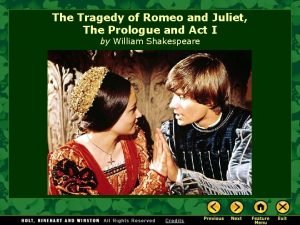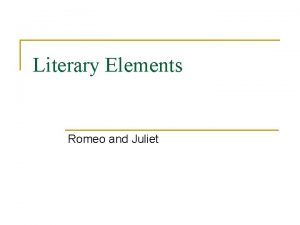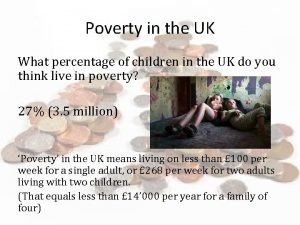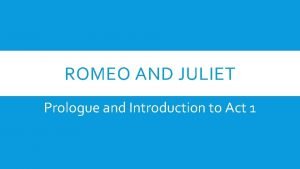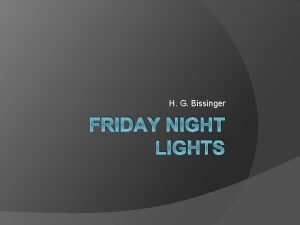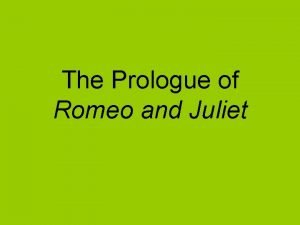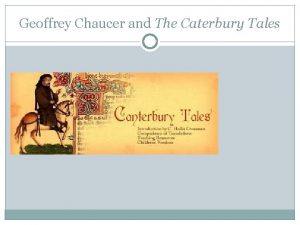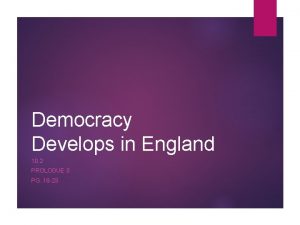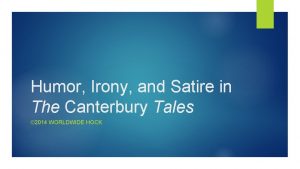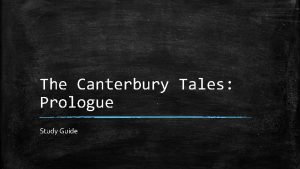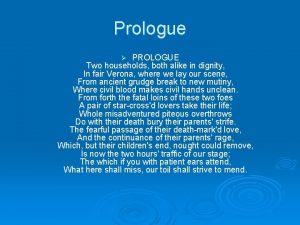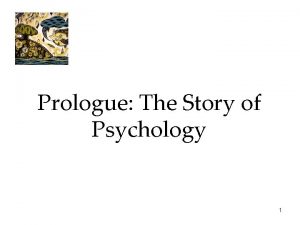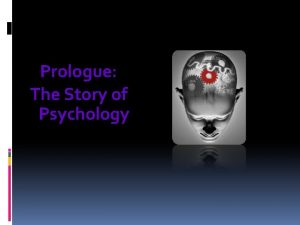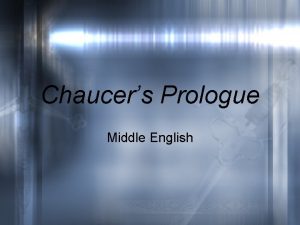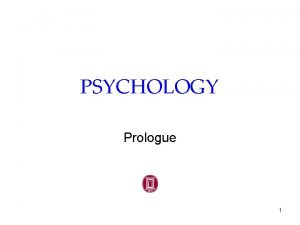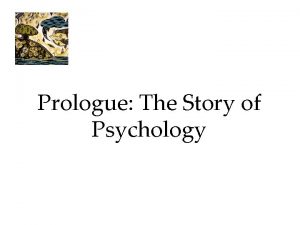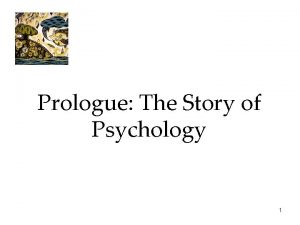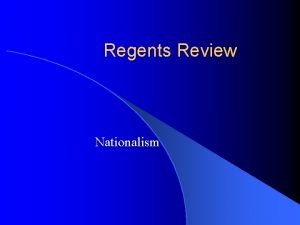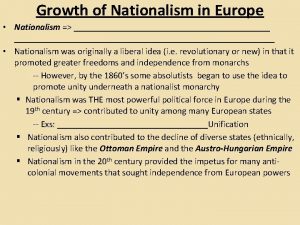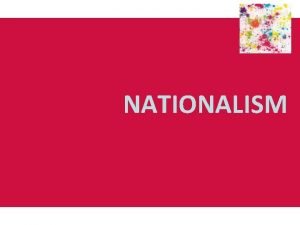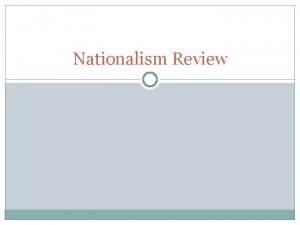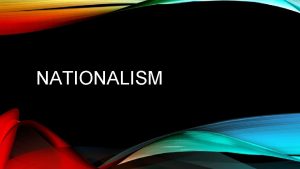Prologue Understanding Nationalism What is Nationalism With a

















- Slides: 17

Prologue Understanding Nationalism

What is Nationalism? With a partner, discuss the different definitions for “nationalism” found on Pg. 2. Answer the following questions: How are they similar? How are they different? In your Nationalism Notebook, write your first entry answering this question: If you had to choose one of these definitions, which would it be? Explain why.


What is an issue? An issue is a question or situation about which thoughtful, well informed and well meaning people may have various points of view and perspectives. A point of view is held by a single person. A perspective is a shared view held by a group or a collective.

Elements of Issues Many issues include a combination of the following elements: Policy - What should individuals, organizations, groups or government? EX: Should the federal government try to meet the targets set out in the Kyoto Protocol? Values - What is good or bad, right or wrong, more or less important or desirable? EX: Should violent video games be banned?

Elements of Issues continued… Definition - What is the meaning of the word or term? Does nationalism hold the best hope for global security? Fact - What is true or correct? Is extracting oil from the tar sands damaging the environment beyond repair? History - Was an action justified, or did an event have a positive outcome? Should Canada and its Allies have invaded Afghanistan?

Practice Identifying & Asking Issue Questions With a partner, examine the questions on Pg. 5 and identify the issue elements in each. There is no need to answer the questions. Remember, some may contain more than one issue element. Then, for each category, work together to create an issue question (5 in total). Your questions can also include more than one element.

Page 5 Questions 1. 2. 3. 4. 5. Is nationalism a positive or negative force in the world? Was Pierre Trudeau’s National Energy Program a power grab by Ottawa? Is pursuing nationhood a legitimate goal? Should Canada accept more immigrants to strengthen the economy? Does the idea of nation matter in today’s globalized world?

Critical Thinking Criteria – used to guide decisions From Greek root “critic”, “criticize” & “critical” Standard of judging Logical way to support a choice or point of view Pg. 6 - What Criteria Would You Use?

Critical Thinking – Case 1 Your school’s environment club has brainstormed to create a list of worth projects. Now club members must choose one. The selected project should: Be achievable over the course of the school year Be something that will draw a lot of student support and….

Critical Thinking – Case 2 Your friends and classmates have decided to nominate you for a position on your school’s student government. You must decide whether to accept the nomination. Your decision depends on: Whether you can change the hours of your part- time job so that you can attend meeting and…

What are Powerful Questions? Promote curiosity & lead to more questions Open ended no one correct answer Require answers that promote deeper understanding Thought provoking involve making decisions with criteria May begin with the following: Which, What if, How, Why, Should, To what extent

Identifying Powerful Questions With a partner, discuss which of the following are powerful questions and which are not. 1. When did the Canadian government decide to join the North Atlantic Treaty Organization? 2. Why did Canada decide to join NATO? 3. Why should Canada continue to belong to NATO? 4. What is the most important benefit or drawback of Canada’s membership to NATO? 5. To what extent does membership in NATO reduce Canadian sovereignty?

Asking Powerful Questions Choose one of the following topics: Cyber Bullying Smoking Awareness The Legalization of Marijuana Underage Drug & Alcohol Abuse The Future of Employment in Alberta Imagine that a speaker will visit your school to discuss the topic. Create three (3) powerful questions to ask the speaker. When formulating powerful questions, think about what… is worth knowing? is uncertain? leads to a deeper understanding? makes people think?

Terms Used to Understand Nationalism DEVELOPED COUNTRIES Wealth democracies of North America and Europe Also called “global north” DEVELOPING COUNTRIES Countries that have weaker economies Also called “global south”

Terms Used to Understand Nationalism Multiculturalism Belief, doctrine or policy that embraces ethnic/ cultural diversity & promotes a culturally pluralistic society Pluralism Belief that society should reflect an inclusive approach that encourages diversity

Terms Used to Understand Nationalism Francophone people whose first language is French Francophone colonists were one of Canada’s founding people, therefore we are a bilingual country Aboriginals Europeans often imposed their own names on Aboriginal people’s they met Aboriginal peoples have recently begun to reclaim their traditional names and prefer to be known by these names
 Symbol for wanderer
Symbol for wanderer Romeo and juliet act iv continued
Romeo and juliet act iv continued Quotes from friar lawrence marrying romeo and juliet
Quotes from friar lawrence marrying romeo and juliet Prologue american beginnings
Prologue american beginnings The tragedy of romeo and juliet prologue
The tragedy of romeo and juliet prologue Alliterations in romeo and juliet
Alliterations in romeo and juliet Blood brothers prologue
Blood brothers prologue Romeo and juliet prolouge
Romeo and juliet prolouge Eiger night light
Eiger night light Romeo and juliet pick up lines
Romeo and juliet pick up lines Hamartia romeo and juliet
Hamartia romeo and juliet Cantebury tales prologue
Cantebury tales prologue Democracy develops in england
Democracy develops in england Earth science prologue review
Earth science prologue review Comedic ladder
Comedic ladder Which characters appear in the prologue romeo and juliet
Which characters appear in the prologue romeo and juliet Cupid quotes in romeo and juliet
Cupid quotes in romeo and juliet The canterbury tales prologue study guide
The canterbury tales prologue study guide


